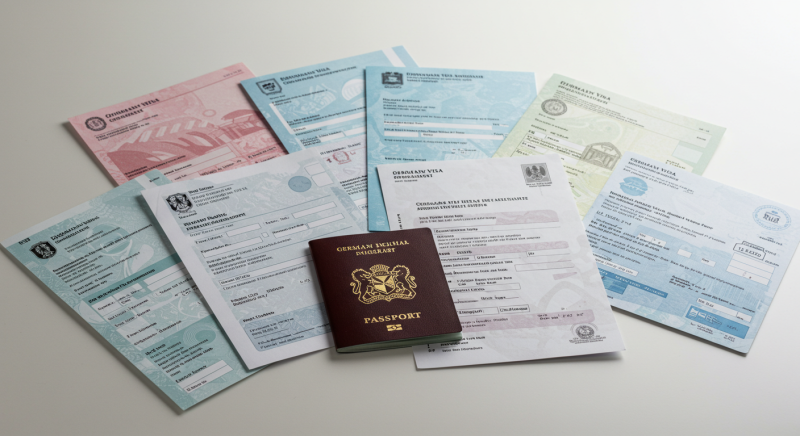The Life-Changing Journey Millions of Nigerians Dream About
Picture this: You’re sitting in your Lagos office, scrolling through job opportunities on LinkedIn, when you stumble upon an exciting position in Berlin or Munich. Your heart races as you imagine yourself living in Germany, earning in Euros, and building a future your children will thank you for. But then reality hits – the complex maze of work permit requirements in Germany for Nigerians makes your dream feel impossible.
If this scenario sounds familiar, you’re not alone. Over 15,000 Nigerians currently live and work in Germany, and thousands more are actively seeking pathways to join them. The good news? Germany has simplified its immigration system, making it more accessible for skilled Nigerians to pursue their European dreams.
Key Takeaways: Your Roadmap to Success
Understanding work permit requirements in Germany for Nigerians can transform your career prospects. Here are the essential points we’ll explore in detail:
EU Blue Card Benefits: This premium work permit offers fast-track permanent residency, with 21 months being the shortest path to settlement for highly skilled professionals earning above €45,300 annually.
Freelance Visa Flexibility: Perfect for entrepreneurs and creative professionals, this visa allows self-employment without minimum income requirements, though you must prove financial sustainability.
Application Timeline Reality: EU Blue Card applications typically take 2-3 months, while freelance visas can take 3-6 months depending on your business plan complexity.
Financial Requirements Decoded: Blue Card requires a concrete job offer with specific salary thresholds, while freelance visas need proof of financial stability and viable business concept.
Long-term Settlement Paths: Both options lead to permanent residency, but through different timelines and requirements that significantly impact your family’s future.

Understanding Germany’s Work Permit Landscape for Nigerians
Germany’s approach to work permit requirements in Germany for Nigerians has evolved significantly since 2020. The country recognizes Nigeria as a source of highly skilled professionals, particularly in technology, healthcare, and engineering sectors.
Recent statistics from the German Federal Employment Agency show that Nigerian applications for work permits increased by 45% in 2024 compared to 2023. This surge reflects both Germany’s growing demand for skilled workers and improved accessibility of their immigration system.
The German government operates two primary pathways for Nigerian professionals seeking long-term employment. Each option serves different career goals and personal circumstances, making it crucial to understand which aligns with your specific situation.
The Skilled Worker Shortage Creating Opportunities
Germany faces an unprecedented skilled worker shortage, with over 2 million vacant positions across various sectors. This crisis particularly affects IT, healthcare, engineering, and skilled trades – areas where many Nigerian professionals excel.
For Nigerian applicants, this shortage translates into genuine opportunities rather than mere possibilities. German employers actively seek international talent, with many companies now offering relocation packages specifically targeting skilled professionals from countries like Nigeria.
EU Blue Card: The Premium Pathway for Highly Skilled Professionals
The EU Blue Card represents the gold standard among work permit requirements in Germany for Nigerians. Designed for university graduates with specialized skills, this permit offers the fastest route to permanent residency in Germany.
Eligibility Criteria That Matter
Your qualification for the EU Blue Card depends on meeting specific academic and professional standards. You must possess a university degree that German authorities recognize as equivalent to their domestic qualifications. This recognition process, called “Anerkennung,” involves submitting your certificates to relevant German authorities for evaluation.
The salary threshold forms another critical requirement. For 2024, the minimum annual gross salary stands at €45,300 for most professions. However, professionals in shortage occupations like IT specialists, engineers, and medical professionals can qualify with €39,682 annually – a significant advantage for Nigerian tech professionals and healthcare workers.
Job Offer Requirements and Employer Responsibilities
Unlike freelance options, the EU Blue Card requires a concrete job offer from a German employer before application. This employer must demonstrate that the position matches your qualifications and meets the salary requirements. The job contract should specify at least 12 months of employment, providing security for both you and German immigration authorities.
German employers hiring through the Blue Card system often assist with the application process. Many companies maintain dedicated immigration support teams, understanding that successful visa applications benefit their business operations.
Processing Timeline and Application Steps
The EU Blue Card application process typically requires 2-3 months from submission to approval. You’ll submit your application at the German embassy in Lagos or Abuja, depending on your location.
Required documents include your university certificates with apostille certification, job contract from German employer, proof of professional experience, passport photographs meeting German specifications, and completed application forms with supporting statements.
Fast-Track to Permanent Residency
The EU Blue Card’s most attractive feature is its accelerated path to permanent residency. After 21 months of continuous residence with basic German language skills (A1 level), you can apply for permanent residency. Without German language certification, the timeline extends to 33 months – still faster than most other visa categories.
This timeline includes your family members, who can join you immediately and work without additional permits. Your spouse receives unrestricted work authorization, while your children access free German education from kindergarten through university level.
Freelance Visa: Freedom and Flexibility for Entrepreneurs
The freelance visa offers a different approach to work permit requirements in Germany for Nigerians, particularly appealing to entrepreneurs, creative professionals, and consultants seeking independence from traditional employment structures.
Understanding Freelance vs. Self-Employment Categories
German immigration law distinguishes between “Freiberufler” (freelancers) and “Gewerbetreibende” (business operators). Freelancers work in recognized liberal professions including consulting, writing, design, translation, and similar knowledge-based services. Self-employment involves more traditional business operations with potentially different regulatory requirements.
This distinction affects your application strategy and ongoing obligations in Germany. Freelancers typically face simpler tax obligations and regulatory requirements compared to traditional business operators.
Financial Proof Without Minimum Income Requirements
Unlike the EU Blue Card’s rigid salary thresholds, freelance visas don’t specify minimum income requirements. However, you must demonstrate financial sustainability through various means. German authorities expect proof that your freelance activities can support you and any family members without relying on public assistance.
This proof typically includes bank statements showing several months of expenses, contracts or letters of intent from potential German clients, detailed business plan outlining your services and target market, and professional references establishing your expertise and reputation.
Business Plan Requirements That Actually Work
Your business plan forms the cornerstone of your freelance visa application. German immigration officers evaluate whether your proposed activities serve genuine economic interests and demonstrate realistic income potential.
Successful business plans include detailed market analysis of German demand for your services, realistic financial projections for at least the first two years, clear description of your services and target clients, and explanation of how your background prepares you for success in the German market.
Timeline and Processing Expectations
Freelance visa applications typically take 3-6 months for processing, longer than EU Blue Cards due to the individualized nature of each business plan evaluation. German consulates carefully review each application to ensure proposed activities align with immigration regulations and economic interests.
The extended timeline reflects the thorough evaluation process rather than application complexity. Many successful applicants report that detailed preparation and professional presentation significantly influence approval likelihood.

Detailed Comparison: Which Path Suits Your Goals?
Understanding work permit requirements in Germany for Nigerians requires honest assessment of your career goals, financial situation, and personal preferences. Each pathway offers distinct advantages depending on your circumstances.
Career Stability vs. Entrepreneurial Freedom
The EU Blue Card suits professionals seeking stable employment with established German companies. You receive immediate job security, structured career progression, and comprehensive social benefits including health insurance, unemployment protection, and pension contributions.
Freelance visas appeal to entrepreneurs valuing independence and flexibility. You control your schedule, choose your clients, and potentially earn higher income through diverse revenue streams. However, you assume greater financial risk and responsibility for your own social insurance coverage.
Financial Considerations and Long-term Wealth Building
EU Blue Card holders enjoy predictable income with German employment protections. Your salary includes automatic deductions for social insurance, creating long-term financial security through unemployment insurance, health coverage, and pension contributions.
Freelancers potentially earn higher gross income but must manage their own tax obligations and social insurance. German freelancers pay income tax rates ranging from 14% to 45% based on earnings, with additional flexibility to optimize tax strategies through business expenses and professional deductions.
Family Immigration and Integration
Both pathways allow family reunification, but with different implications. EU Blue Card holders’ families receive immediate work authorization and access to German social services. Children integrate into German schools with structured support systems designed for international families.
Freelance visa holders can also bring families, but integration may require more personal initiative. Your family members receive residence permits tied to your visa status, requiring renewal based on your business success and continued residence eligibility.
Path to German Citizenship
Both visas ultimately lead to German citizenship eligibility, but through different timelines. EU Blue Card holders can apply for citizenship after 6-8 years of continuous residence, depending on German language proficiency and integration demonstration.
Freelance visa holders follow similar timelines but must demonstrate consistent business success and tax compliance throughout their residence period. German authorities evaluate citizenship applications based on economic integration and contribution to German society.
Step-by-Step Application Strategy for Success
Navigating work permit requirements in Germany for Nigerians successfully requires systematic preparation and attention to detail. Your approach should account for the specific requirements of your chosen pathway while maximizing approval likelihood.
Document Preparation and Authentication
Begin document preparation at least 6 months before your planned application submission. German authorities require apostille certification for Nigerian educational certificates, a process that can take several weeks through the Nigerian Ministry of Foreign Affairs.
Professional translation of documents into German significantly improves application processing speed. Use certified translators recognized by German authorities, ensuring accuracy and compliance with immigration requirements.
Timing Your Application for Maximum Success
Submit EU Blue Card applications after securing your job offer but before your intended start date. German employers often coordinate with immigration lawyers to ensure proper timing and documentation alignment.
Freelance visa applications benefit from advance market research and client development. Begin building German business relationships months before application submission, demonstrating genuine economic interest and viability.
Embassy Interview Preparation
German embassy interviews focus on verifying information accuracy and assessing genuine intentions. Prepare detailed explanations of your career goals, understanding of German business culture, and long-term integration plans.
Practice explaining complex aspects of your application in clear, straightforward language. Embassy officers appreciate applicants who demonstrate thorough preparation and realistic expectations about life in Germany.
Common Mistakes That Delay Approval
Incomplete financial documentation frequently delays applications. Ensure all bank statements, employment letters, and financial projections align with stated requirements and present consistent information.
Inadequate business plan development affects freelance applications significantly. German authorities expect professional-quality documentation demonstrating serious business intentions rather than casual exploration of opportunities.
Real Success Stories: Learning from Nigerian Experiences
Understanding work permit requirements in Germany for Nigerians becomes clearer through examining actual success stories. These experiences highlight practical strategies and common challenges faced by Nigerian professionals.
Tech Professional’s Blue Card Journey
Chinedu Okafor, a software developer from Lagos, secured his EU Blue Card in 2023 after eight months of preparation. His strategy involved networking with German tech companies through LinkedIn, participating in virtual job fairs specifically targeting international developers, and obtaining German language certification while still in Nigeria.
Chinedu’s salary of €52,000 exceeded Blue Card requirements, expediting his application approval. His family joined him six months later, with his wife immediately finding employment in Berlin’s thriving startup ecosystem.
Creative Professional’s Freelance Success
Amaka Nwosu transitioned from advertising agency work in Lagos to freelance graphic design in Munich. Her application success stemmed from building client relationships through international design platforms, creating a comprehensive portfolio showcasing work for European brands, and developing detailed financial projections based on existing client contracts.
Amaka’s first-year earnings of €38,000 demonstrated the viability of her business model. She subsequently expanded into brand consulting, increasing her income to €55,000 by her second year in Germany.
Healthcare Professional’s Strategic Approach
Dr. Emeka Okwu leveraged Germany’s healthcare worker shortage to secure a Blue Card position with a Munich hospital. His preparation included obtaining recognition of his Nigerian medical degree through the relevant German medical board, completing German language certification to B2 level before application, and networking with German healthcare recruiters specializing in international physician placement.
Dr. Okwu’s experience highlights the importance of professional recognition processes that can extend application timelines but significantly improve success probability.
Navigating Common Challenges and Solutions
Work permit requirements in Germany for Nigerians present several recurring challenges that successful applicants learn to address systematically. Understanding these obstacles helps develop effective preparation strategies.
Language Requirements and Cultural Integration
German language proficiency requirements vary between visa types but significantly impact long-term success. EU Blue Card applications don’t require German certification, but language skills accelerate career advancement and social integration.
Begin German language study early in your preparation process. Online platforms like Babbel and Duolingo provide foundation skills, while formal courses through Goethe Institut offer certification recognized by German authorities. Many successful applicants achieve A2-B1 level before arrival, facilitating workplace communication and administrative processes.
Professional Recognition and Credential Evaluation
German authorities maintain strict standards for professional recognition, particularly affecting regulated professions like healthcare, engineering, and legal services. Research recognition requirements specific to your profession through the German Federal Office for Migration and Refugees website.
Begin credential evaluation processes early, as some professions require additional examinations or training courses. Engineering professionals often need to demonstrate familiarity with German technical standards, while healthcare workers must pass language and professional competency examinations.
Financial Planning and Cost Management
Moving to Germany requires substantial financial preparation beyond visa application fees. Consider accommodation deposits typically ranging from 2-3 months rent, initial living expenses for 2-3 months while establishing banking and employment, health insurance coverage from arrival date, and transportation costs including potential car purchase or public transit passes.
EU Blue Card holders often receive relocation assistance from employers, while freelancers must budget independently. Create detailed financial projections accounting for both setup costs and ongoing monthly expenses in your target German city.
Healthcare System Navigation
Germany’s healthcare system requires immediate enrollment upon arrival. EU Blue Card holders typically receive employer-sponsored coverage through statutory health insurance, automatically deducting premiums from salary.
Freelancers must arrange private or voluntary statutory health insurance, with monthly costs ranging from €200-600 depending on coverage level and provider. Research health insurance options before arrival, as coverage affects visa approval and renewal processes.
Financial Planning: Budgeting for Your German Dream
Understanding work permit requirements in Germany for Nigerians includes comprehensive financial planning that extends beyond visa application costs. Successful applicants prepare detailed budgets accounting for all aspects of relocation and initial settlement.
Visa Application and Processing Costs
EU Blue Card applications require €75 visa fee plus additional costs for document preparation, translation, and apostille certification. Budget approximately ₦150,000-₦200,000 for complete application preparation including professional translation services and embassy fees.
Freelance visa applications carry similar base costs but may require additional expenses for business plan development and legal consultation. Professional business plan preparation services range from €500-1,500, representing worthwhile investment for complex applications.
Relocation and Settlement Expenses
German apartment rentals typically require substantial upfront payments including first month’s rent, security deposit equivalent to 2-3 months rent, and broker fees ranging from 1-2 months rent. Total accommodation costs often reach €3,000-5,000 before moving in.
Budget for immediate necessities including basic furniture, kitchen appliances, and household items. Many successful relocators recommend shipping essential items from Nigeria while purchasing larger furniture locally to avoid shipping costs and customs complications.
Monthly Living Costs by German Cities
Living costs vary significantly across German cities. Munich and Frankfurt represent expensive options with monthly expenses reaching €2,500-3,000 for comfortable living. Berlin offers moderate costs around €2,000-2,500 monthly, while smaller cities like Leipzig or Dresden provide affordable alternatives at €1,500-2,000 monthly.
These estimates include accommodation, food, transportation, health insurance, and discretionary spending. Adjust budgets based on your lifestyle preferences and family size, remembering that German salaries typically provide comfortable living standards when properly managed.
Building Emergency Funds and Long-term Savings
Establish emergency funds covering 3-6 months of expenses before relocating. German employment contracts provide security, but initial adjustment periods may involve unexpected costs or delayed income start dates.
Consider ongoing financial obligations in Nigeria including family support and property maintenance. Many successful emigrants maintain Nigerian bank accounts for family remittances while building German savings for long-term goals like property purchase or children’s education.
Long-term Implications: Building Your Future in Germany
Work permit requirements in Germany for Nigerians represent just the beginning of your German journey. Understanding long-term implications helps make informed decisions about visa pathways and career strategies.
Career Advancement and Professional Development
German employment culture emphasizes continuous learning and professional development. EU Blue Card holders often access company-sponsored training programs, language courses, and professional certifications that enhance career progression.
Freelancers must invest in their own professional development but enjoy greater flexibility in choosing specializations and expanding service offerings. German markets reward expertise and reliability, creating opportunities for significant income growth over time.
Property Ownership and Wealth Building
Both visa pathways ultimately enable property ownership in Germany. Banks typically require 2-3 years of German employment history before approving mortgage applications, making early financial planning crucial for future property purchases.
German property markets offer stability and long-term appreciation potential. Many successful Nigerian immigrants transition from rental accommodation to property ownership within 3-5 years, building substantial equity in valuable German real estate markets.
Children’s Education and Future Opportunities
German education systems provide exceptional opportunities for immigrant children. Public schools offer high-quality education through university level without tuition fees, while international schools cater to multilingual families preferring English-language instruction.
German universities rank among world’s best, with minimal fees even for international students. Your children gain European Union citizenship through naturalization, accessing educational and employment opportunities across 27 EU countries.
Retirement Planning and Social Security Benefits
German social security systems provide comprehensive retirement benefits for long-term residents. EU Blue Card holders accumulate pension credits from employment start, while freelancers can contribute voluntarily to statutory pension systems or develop private retirement savings.
Consider German pension benefits alongside any Nigerian retirement planning, understanding how international social security agreements may affect future benefit eligibility and payment options.

Conclusion: Your Path Forward Starts Today
Understanding work permit requirements in Germany for Nigerians opens doors to life-changing opportunities that extend far beyond career advancement. Whether you choose the stability of an EU Blue Card or the flexibility of a freelance visa, Germany offers pathways to build the future you’ve always imagined for yourself and your family.
The key to success lies in honest self-assessment of your goals, thorough preparation of your application, and realistic expectations about the challenges and rewards ahead. Germany’s simplified immigration system, combined with their genuine need for skilled professionals, creates unprecedented opportunities for Nigerian talent.
Remember that thousands of Nigerians have successfully navigated these same work permit requirements in Germany for Nigerians and now thrive in German cities from Berlin to Munich. Your success depends not on luck or connections, but on systematic preparation and strategic decision-making about which pathway aligns with your career goals and personal circumstances.
Take the first step today by researching German employers in your field, beginning German language study, or developing that business plan for your freelance venture. Your German dream is not just possible – with proper preparation and determination, it’s inevitable.
Frequently Asked Questions
What are the main work permit requirements in Germany for Nigerians? The primary work permit requirements in Germany for Nigerians include having a recognized university degree, securing either a job offer (for EU Blue Card) or demonstrating viable freelance business plan, meeting financial sustainability requirements, and providing comprehensive documentation including certificates, passport, and proof of accommodation.
How long does it take to process work permit requirements in Germany for Nigerians? EU Blue Card applications typically take 2-3 months for processing, while freelance visa applications require 3-6 months due to business plan evaluation complexity. Processing times may vary based on embassy workload and application completeness.
Can my family join me under work permit requirements in Germany for Nigerians? Yes, both EU Blue Card and freelance visa holders can bring their families to Germany. Spouses receive immediate work authorization, while children access free German education. Family members’ residence permits link to the primary visa holder’s status.
What salary requirements exist for work permit requirements in Germany for Nigerians? EU Blue Card requires minimum €45,300 annually for most professions, or €39,682 for shortage occupations. Freelance visas don’t specify minimum income but require proof of financial sustainability to support yourself and family without public assistance.
Do work permit requirements in Germany for Nigerians include German language skills? German language certification isn’t mandatory for initial visa applications, but significantly improves employment prospects and integration success. B1-B2 level German accelerates permanent residency eligibility and citizenship applications.
How much do work permit requirements in Germany for Nigerians cost? Visa application fees cost €75, with additional expenses for document preparation, translation, and apostille certification totaling approximately ₦150,000-₦200,000. Relocation costs including accommodation deposits and initial living expenses require €5,000-10,000 additional budget.
Can I switch between visa types after meeting initial work permit requirements in Germany for Nigerians? Yes, you can transition between visa types based on changing circumstances. EU Blue Card holders can switch to freelance status, while successful freelancers may obtain Blue Cards if they secure employment meeting salary requirements.
What happens if I don’t meet work permit requirements in Germany for Nigerians initially? Unsuccessful applications can be resubmitted after addressing deficiencies identified by immigration authorities. Common issues include incomplete documentation, insufficient financial proof, or inadequate business plans for freelance applications. Professional consultation often improves subsequent application success.
External Sources
- Make it in Germany – Official German Government Immigration Portal
- German Federal Office for Migration and Refugees (BAMF)
- Germany Visa Information Center
- Law and Visas – Germany Freelance Visa Guide
- Nairametrics – German Work Visa Information for Nigerians
READ MORE
10 Essential Environmental Conservation Grants in Australia: Your Ultimate Guide to Funding Success
